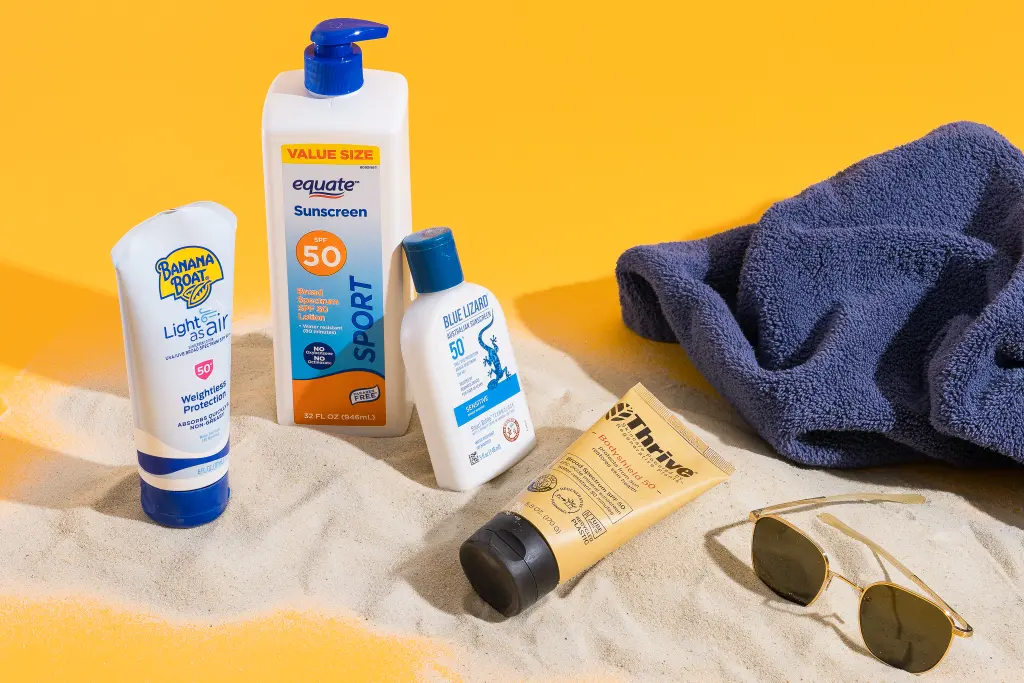Go to any drugstore during the summer months and you’ll see shelves devoted to sunscreen. There’s sun protection products for your face, body, and even for your children There’s tinted sunscreen as well as makeup that has SPF and creams, sprays and lotions. There are a myriad of options with numerous distinctions between them and perhaps the most significant factor in deciding is chemical sunscreen versus mineral.
Sun protection is crucial year-round, whether you’re beach bound or sitting at home in front of the window, and finally, “the best sunscreen is one you’ll repeatedly,” says board-certified dermatologist Henry Lim, M.D. as well as the program director of research in dermatology at the C.S. Livinggood fellowship program at the Henry Ford Health System in Detroit. “As long as your sunscreen is broad spectrum, water-resistant and has an SPF of 30 or higher, it can effectively protect you from the sun.”
However, mineral sunscreen is quickly gaining popularity and a growing number of people are opting for chemical-based UV blocking due to various reasons. We talked to experts who described the differences between the two, and gave their tips for the most effective mineral sunscreens available.
What is mineral sunscreen and how does it differ than chemical sunblock?
All sunscreens have filters to protect your skin from sun’s rays. The distinction between mineral (also called physical) and chemical sunscreens lies in the kind of filter and the function it performs. Chemical sunscreens may employ an array of active filters including the most commonly used are Octisalate, oxybenzone and avobenzone, which absorb UV radiation. Mineral sunscreens, for instance rely on titanium dioxide or zinc oxide (or the two) to block physical rays which reflect UV rays off your skin. According to Carmen Castilla, M.D. who is a dermatologist board-certified who is also a clinician in the Mount Sinai Medical Center at Mount Sinai at Mount Sinai in New York, notes, the absorption process used by chemicals in sunscreens “causes them to degrade over time,” and the reflection processes of the mineral sunscreens implies that “there is no chemical reaction that breaks them down with UV rays.”

If used correctly If used properly, both types of sunscreens will accomplish the task. A lot of people prefer mineral sunscreens over chemical ones and not just due to their sun protection capabilities, but due to the possible health consequences of chemicals. The review of the 2020 season by the Food and Drug Administration’s Center for Drug Evaluation and Research discovered that seven of the chemicals commonly found in sunscreenssuch as avobenzone and oxybenzone homosalate, ecamsule and octocrylene as well as octisalate, octinoxate and homoare taken into the bloodstream after only one application. The FDA has already requested sunscreen makers to conduct further safety tests of these ingredients. However, the agency as well as scientists have emphasized that the results of the 2020 study do not mean that sunscreens containing these chemicals are harmful. The FDA has classified titanium dioxide and zinc oxide in the category of “safe and effective” for sunscreen usage. There is however an evident connection to sun exposure with skin cancer therefore it is essential to continue applying that SPF.
There have been other studies and reports about the effects of sunscreen chemicals across the globe, with a particular focus in coral reefs. For instance certain studies have shown that a small amount of oxybenzone and octinoxate could cause bleaching and coral damage in a laboratory however like Julie Andersen, global director of public relations and brand of PADI, the Professional Association of Diving Instructors (PADI), says that more research is needed to determine the impact on reefs that occur that are in nature. “Extremely high concentrations of sunscreen chemicals are harmful to the larvae of one species of coral, but that doesn’t mean that sunscreen washing off your skin when you go swimming is the reason for global coral bleaching,” she says, noting that the most significant and important threat to coral reefs is the threat of climate change.
Are mineral sunscreens good for your skin?
“Some individuals with sensitive or reactive skin may find mineral sunscreens less irritating compared to chemical sunscreens,” says Akis Ntonos dermatologist nurse practitioner injectable specialist, cofounder of Aion Aesthetics in New York. “Mineral sunscreens tend to be less likely to cause allergic reactions or skin irritation, although this can vary from person to person.”
It’s a good choice to stick with mineral sunscreens, especially ones that are labeled “noncomedogenic,” “oil-free” or “won’t clog pores,” according to Lim -If you suffer from skin issues like dermatitis, acne, eczema as well as hyperpigmentation hyperpigmentation, which is especially prevalent in people with darker skin that also require sunscreen protection from the sun. “There’s a misconception that browner or darker skin tones don’t need to use sunscreen because ‘we have melanin’ or ‘we don’t burn from sun exposure,'” claims Taylor Bagby, registered nurse and specialist in aesthetic nursing with SkinSpirit. “But Black skin can still be burned and is at risk of hyperpigmentation, which can be aggravated due to sun exposure! While it’s true that melanin can provide dark skin with some protection in the case of skin cancer you’re still vulnerable to injury. There is an opportunity.”
White casts that is especially bothersome for those who have dark skin tones, is one of the drawbacks of certain mineral sunscreens. However there are a growing number of alternatives on the market which blend seamlessly and tinted formulations which may offer advantages. “For people with darker skin tones, tinted sunscreens can be considered, as they can minimize the pigmentation induced by sunlight,” Lim states.
What are the best ways to use mineral sunscreen?
Just as you do with chemical sunscreen, experts recommend you apply your mineral sunscreen 15 to 30 minutes prior to going outside in the sun – and remember to apply it again. “Regardless of which sunscreen you pick to meet your individual requirements, there is one aspect that is not to be missed the importance of consistency when applying sunscreen,” Ntonos says. “Applying sunscreen just once isn’t enough to ensure that your skin stays protected all day long. Always reapply your sunscreen, particularly when sweating, swimming or spending long periods in the sunshine.”





I’ve been browsing online greater than three hours as of late, but I never found any fascinating article like yours.
It’s lovely price enough for me. In my view,
if all webmasters and bloggers made just right content material as
you did, the web shall be much more helpful than ever
before.
I was suggested this website by my cousin. I am not sure whether
this post is written by him as no one else know such detailed about my trouble.
You are incredible! Thanks!